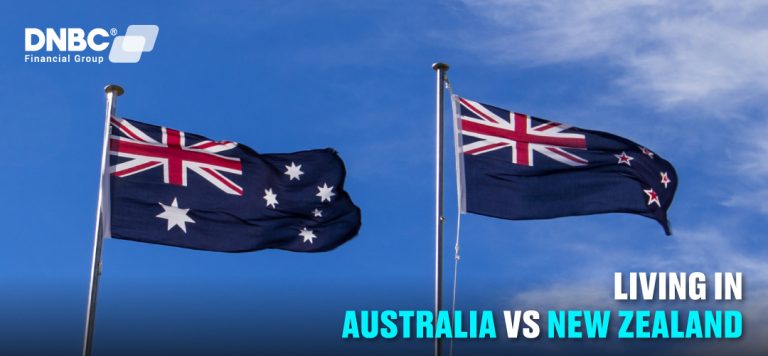Australia and New Zealand are both situated in the southern hemisphere and properly have the closest culture to the UK. People usually say “If you want bucks, go to Australia, if you want the quality of life, choose New Zealand”. Well, one is large and diverse, with stunning coastal cities and a dry rot countryside, while the other is composed of two islands, soaring mountains, glacial lakes, and beautiful rolling countryside. But you are not sure Living in Australia or New Zealand suits you better? Read on to discover the similarities, differences and what makes each country unique.

Living in Australia vs New Zealand – What is so great about these two countries?
Cost of living in Australia vs New Zealand
As you can see, New Zealand has a smaller population compared to its neighbor, therefore, the chance to find a job in this island is sometimes harder and wages can be lower than in your country and Australia too.
New Zealand is isolated islands, and it has to import a lot of goods, which can make food shopping pricey. Unlike neighboring New Zealand, Australia is a large continent with full of ability to cater for itself the majority of goods, necessities and energy, etc. Although it is generally less expensive than in New Zealand, living cost in Australia is nevertheless high when it comes to housing expenditure, and with higher prices for everything from restaurants and groceries to petrol.
Even though it costs more to find a home near the beach in a city, 82% of Aussies live within 50 kilometers of the coastline if they choose to make Australia their residence. When comparing the cost of living in Australia vs New Zealand in terms of house rent, New Zealand is the more affordable country to live in. Let’s look at the below actual number in rental prices in New Zealand compared to Australia:
| Rent | New Zealand | Australia | |
| 1-bedroom apartment in the city center | 1,680.84 | 2,071.69 (A$1,913.50) | +23.25% |
| 1-bedroom apartment outside the city center | 1,334.07 | 1,602.70 (A$1,480.32) | +20.14% |
| 3-bedroom apartment in the city center | 2,782.55 | 3,552.98 (A$3,281.67) | +27.69% |
| 3-bedroom apartment outside the city center | 2,244.46 | 2,444.50 (A$2,257.83) | +8.91% |
Source: emigrationnewzealand.com
What are the benefits of working in Australia?
In Australia, there are many job prospects for people between the ages of 18 and 30 in the majority of industries.
The need for employees in rural areas of the nation enables travelers to make a great wage, accumulate savings, and then apply for a second-year visa.
It’s crucial to keep in mind the paperwork you’ll need if you want to work in Australia. These documents include an:
- Australian Tax File Number (TFN)
- Australian Bank Account
- An appropriate Visa
To help you transfer money from your home to facilitate a new life in Australia, you can open a personal account with DNBC Financial 100% online registration, and you don’t need to visit any branch. After relocating to Australia, you can open a local bank account, and transfer money from your personal DNBC account to Australia with reasonable wire transfer fees.
As you accumulate savings after years working in Australia, it is possible to send money back to your home country, support your family, pay loan, or buy new property to your DNBC receiving account (beneficiary account).

What are the benefits of working in Australia?
What are the benefits of working in New Zealand?
Auto-enrolment in pensions is used in New Zealand. New employees are registered in the national scheme between the ages of 18 and 65. Instead, individuals can enroll in a qualifying superannuation plan offered by their employer.
Numerous workplaces in New Zealand provide perks like life, disability, and income insurance. Child Care assistance, work flexibility, and gym membership are additional benefits.
In New Zealand, achieving a healthy work-life balance is highly valued, and employers are required to provide employees with time off from demanding work schedules.
Organizations in New Zealand place significantly less emphasis on status, rank, and hierarchies than do workplaces abroad.
The employees in New Zealand respect managers and view them as members of the team.
Similar to working in Australia, you need to have an international payment account for payment like DNBC in order to begin a new life in New Zealand. In the early stages of your stay in a new country, opening an online personal account can let you make international internet banking transfers to your local New Zealand bank account for your everyday expenses or you can send money back to your home country by your DNBC account.

What are the benefits of working in New Zealand?
Key takeaways
Living in Australia
Pros
- Australians have a higher standard of living and make more money.
- Australia’s typical annual income is AUD 79,632.
- There are few unemployed people.
- Australia will provide you with more options and prospects to advance your profession.
- Australia has a top-notch healthcare system and educational system.
- Warmer weather.
- Earthquakes are rare.
- Being globally connected.
- Greater cultural diversity.
- Better global connectivity.
Cons
- High cost of living.
- Finding a job takes time and effort.
- Mortgages are difficult to obtain (especially for foreigners).
- Real estate is incredibly expensive.
- Lifestyle and culture: Smaller communities lack a diverse range of activities.
- The cost of private health insurance is high.
- Traveling between cities is challenging, and distance can be far.
Living in New Zealand
Pros
- New Zealand offers lower prices for goods, services, rent, and groceries than Australia does.
- A three-bedroom apartment in New Zealand rents for $2,603.29. In comparison, a comparable property in Australia costs $3,035.28 a month.
- The pace of life in New Zealand is often slower.
- New Zealand was rated as the second-safest nation in the world in 2019. Compared to Australia, New Zealand has a lower crime rate. Additionally, there won’t be any snakes to worry about!
- Several rights for expats.
- Premium healthcare and first-rate education.
- Great food
- Uninhabited, vast wilderness.
Cons
- It’s isolated.
- The cost of imported goods can be expensive.
- Public transportation is expensive, slow, and limited.
- Lots of mosquitoes.
- Dental care is insanely expensive.
- It offers few career options.
- The cost of homes can be very high.
More about DNBC Financial Group
DNBC Financial Group is a reputable startup in Fintech. It offers money transaction solutions anywhere in the world.
By setting a high standard for innovation in the money transfer platform since 2017, DNBC Financial Group has given full solutions to collecting payments, transferring and managing funds.
Currently, DNBC Financial Group has a considerable number of customers all around the world, consisting of many customers transferring money from other parts of the world to Australia and New Zealand online.
DNBC Financial Group is your trusted provider in international money transfer
- Get 100% free 1-on-1 support
- 100% free account opening
- Seamless onboarding process
Or please contact DNBC
![]() Email: [email protected]
Email: [email protected]
![]() Phone Number:
Phone Number:
- +65 6572 8885 (Office)
- +1 604 227 7007 (Hotline Canada)
- +65 8442 3474 (WhatsApp)



 DNBC Team
DNBC Team






